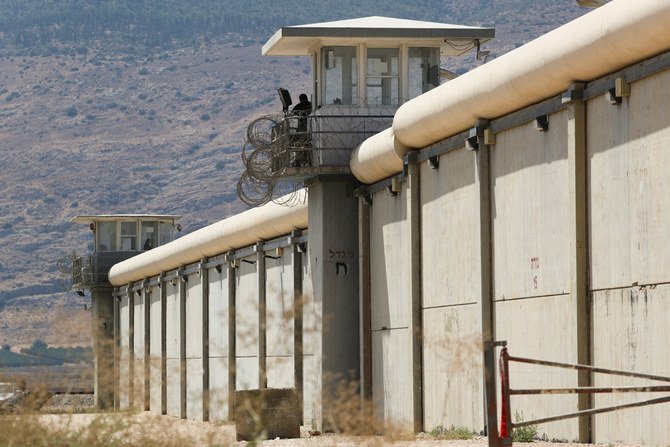Hazem Balousha
GAZA CITY: A former inmate of Israel’s Gilboa Prison has described the recent escape of six Palestinian prisoners as “miraculous.”
Hilal Jaradat, who had been involved in a previous escape attempt from the jail, said prisoners called Gilboa the “Israeli Guantanamo” because of its high walls with barbed wire and a heavy deployment of guards, towers and surveillance cameras that monitor every movement.
Jaradat was arrested in 1985 over the killing of three Israeli soldiers and sentenced to 99 years in prison when he was 19. He spent 27 years in Israeli imprisonment and was deported to Gaza following a prisoner exchange in 2011 between Hamas and Israel.
He was in Gilboa for several years, from where five members of Islamic Jihad and one member of the Fatah Revolutionary Council escaped through a tunnel on Sept. 6.
Jaradat was part of a group that planned their escape from the prison through a tunnel in 1998. Some prisoners got away before the guards discovered the tunnel.
He said it requires great planning and a lot of patience to penetrate the fortifications and the human and technical monitoring system.
Jaradat said the inmates at Gilboa are not given freedom even inside the prison as Israel considers them the most dangerous: They are accused of being behind the killings of Israelis.
He told Arab News that the complex procedures are aimed at “breaking the prisoners’ will,” but “many prisoners do not stop thinking about extracting their freedom by every possible means.”
Jaradat said he and his cellmates, all of them with long sentences, planned their escape through a tunnel extending more than 20 meters, which they dug using spoons and pieces of iron and wood that they extracted from their beds.
“Behind a sink, there was an abandoned toilet with a door permanently closed by heavy welding. We were able to open it with the help of a Druze prisoner. Two of our colleagues took care of the process of disposing of the sand by throwing it into the sewage system. Then we closed the door, removing any traces of activity. The process was repeated daily.” Jaradat said.
Later, he and his companions dug a tunnel directly to the toilet to dispose of the sand more easily.
They faced many obstacles, which they managed to overcome using materials available in the prison. They made a mixture of toothpaste and medicines as a substitute for cement to fix back the floor tiles every night so that the operation is not exposed in the event of a search.
It took 77 days to dig a tunnel 25 meters long and 2.5 meters deep, which 22 prisoners were supposed to use to escape.
However, a simple mistake by one prisoner, who forgot to put “a piece of cardboard to cover the opening of the tunnel” after his exit, led to its exposure.
Jaradat said that the prison department’s reaction was violent. “A large number of soldiers stormed the cells and assaulted the prisoners, and they imposed isolation and deprivation of visitation.”
Jaradat added: “The prison administration was shocked when it discovered the method of digging the tunnel, and how we got rid of about 17 tons of sand. The soldiers found it about five kilometers away from the prison and quantities of it were deposited inside the sewage pipes.”
About 5,000 prisoners, including dozens of women, children and the sick, are currently in the Israeli prisons, and hundreds of them are serving prison sentences for many years.
According to institutions specializing in prisoners’ affairs, about 100 Palestinian prisoners are classified by Israel as “red list” prisoners for having attempted an escape. Israel imposes heavy penalties on these prisoners.






















